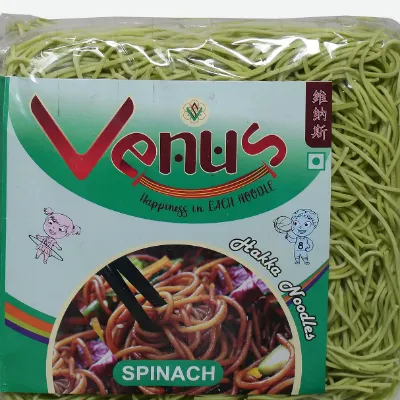Competing with FMCG biggies like Delmonte and Chings, this local noodle brand is fighting for space on your plate
Bengaluru-based husband-wife duo’s Venus Hakka Noodles is polishing its marketing and distribution strategies to go beyond Karnataka.
Company: Skanda Associates (Brand: Venus Hakka Noodles)
Founded in: Feb 2015
Founders : Shilpa S and Santosh Kumar K
Average turnover (last year): Rs 1.2 Cr
Having spent a few years as distributors and marketers for others brands, husband-wife duo Santosh Kumar K and Shilpa S decided to start their own business manufacturing noodles under the brand name, Venus Hakka Noodles.
With an initial investment of Rs 27 lakhs, their company, Skanda Associates, was started as a Distribution Company for FMCG products with a dream and a caption ‘Distribution made easier’. Says Shilpa, “We successfully worked and marketed many companies such as Delmonte, B Natural juices, Weikfield Food Pvt Ltd, and Chings etc. Once we were well established in marketing, a dream of making our own product took birth.” And thus they started their own product, Venus Hakka Noodles. “Initially, the product was outsourced and once the response and demand in the market grew there came a time to start our own small scale manufacturing unit,” she adds.
Their company works on both B2B and B2C models. Besides the availability in retail malls and stores, they also supply to Chinese restaurants and caterers.
Thirty-three-year-old Shilpa S worked as a software engineer, data architect, and as a team lead in Accenture for three years. She was also a Neuro-Linguistic Programming (NLP) coach. Her husband, Santosh Kumar K (36), worked as a merchandising officer in Nilgiris and has 15 years of experience in buying and selling at different FMCG companies.
Shilpa says the reason they decided to start their own business was because there was no job satisfaction for her and moreover she had a 10-day-old infant to take care of. “Both of us decided to get into marketing and distribution of other food brands,” she says.

Shilpa and Santosh
But what prompted them to move to their own product manufacturing was the fact that there was no regular supply from the companies and they had more orders than they could fulfill. “We were doing marketing of competitors’ brands, and would miss orders because there was shortage of stock. We had our revenue target and it was becoming difficult to reach it,” she says.
Today, under the Venus Hakka Noodle brand they have different varieties of noodles, like veg, egg, tomato, spinach, and carrot.
However, Shilpa says the biggest challenge they face is shortage of skilled labour. “Fifty percent of our labour has to be skilled. The rest we hire and train. But it is very tough to find skilled workers,” she adds.
The couple also approached the MSME department to help them with packaging and getting market-ready. “They guided us on how to apply for barcode, and to meet certain standards before we could sell.” The brand is also available on Amazon.
SMBStory spoke to Shilpa bout other aspects of their business journey. Excerpts from the interview.
SMBStory: What key milestones are you looking for your business?
Shipla: We want to get well established in the market and build a face value and rapport with our customers. We want to start a new product and increase our production capacity. We are also looking to spread the word about our product worldwide.
SMBS: How are you differentiating from the competition?
Shilpa: We have a considerably huge FMCG market to make our mark in. We get differentiated from the competition by our quality and price.

A view of the factory
SMBS: What are your challenges in terms of sustaining and growing the business?
Shilpa: The topmost challenge is to hold on to the workers that we have trained. The second is maintaining the quality of our product as well as providing a competitive price in the market. The next challenge is to figure out how to scale and grow big.
SMBS: What is your advice to people who want to set up their business in the same sector?
Shilpa: It is important that you do enough groundwork about the requirement of the kind of product you are going to make. Have a solid distribution and marketing team.
SMBS: How do you manage critical areas such as supplier management, cash flow management, and capital management? Any tips for other business owners?
Shilpa: We make sure our customers (the shop owners) do not run short of our product in their
shops. Extra amount of one-fourth of the total investment amount should be dedicatedly kept aside for the business, which helps us in critical situations when it comes to capital
management.

Venus Hakka Noodles
SMBS: What is your customer acquisition/channel strategy?
Shilpa: Our prime customer acquisition is our quality.
SMBS: What is your dream for your business in the future?
Shilpa: At present, we are active only in Bengaluru, but we have plans to take our product to all
cities of Karnataka.
SMBS: What are your expectations from the government?
Shilpa: Since ours is a small-scale manufacturing unit, we would expect any help with regard to space allotment under any subsidies for expanding it to a larger one.
SMBS: What are the top three leadership lessons that you have learned over the years that you live by?
Shilpa: Administrative skills and handling people in a better way rather than rubbing them the wrong way. Apart from this, capital management and marketing skills are important.
SMBS: What are the biggest learnings from your business journey?
Shilpa: Value for money and time is important. We should also maintain confidentiality with regard to product details in manufacturing.
(This story is published in partnership with the MSME Ministry to showcase success stories of SMEs)







